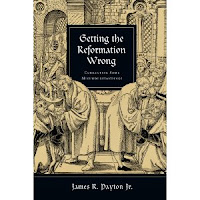
It seems like the worst place to learn about the Protestant Reformation of the 16th century is from modern evangelicals and the best place is often historians who come from outside of the Protestant tradition or even a secular position. Why so? I would say mainly because evangelicals largely don’t think God was active and working in the lives of the Christians during the Middle Ages. Secular historians, especially in recent years (Diarmaid MacCullogh’s The Reformation for example) paint a broader picture of the Reformation and point out that the Reformation is not a revival of moribund Catholicism, but part of wave of great religious interest at the end of the Medieval Age. I think in James R. Payton’s Getting the Reformation Wrong: Correcting Some Misunderstandings we have the warmth of an evangelical scholar who is able put the Protestant Reformation and the Reformers themselves in historical and theological context. I also think Mr. Payton has a tremendous point to make: evangelicals misunderstand the Reformation because they are disconnected from the stream of thought that fed the Reformers, namely the early church fathers and the ecumenical councils. Aside from demonstrating from history that the Protestant Reformation was dealing with theological questions that had been dogging the church at large for nearly two hundred years, Payton addresses two places we modern Christians tend to largely misunderstand the intent of the Reformers. One such idea is Sola Fide (By Faith Alone). In modern America, frontier preachers and revivalists stretched this to mean that an act of momentary faith was all that was required to be saved. It is a handy way to close the deal quickly (which is very important in American religion) but was neither the teaching of the New Testament or the Reformers. Yes, by grace through faith, but scripturally faith is never alone. Real saving faith is always accompanied by a life of good works. The works don’t justify, but they demonstrate an active faith and impulse put there by the regeneration of the Holy Spirit. Another idea that is certainly confused is Sola Scriptura. This is taken today to mean the only authority in a believers life is the Bible and nothing more. Problem is, it simply is not true. The Holy Scriptures come to us with a two thousand year long rich history of interpretation (both excellent and ridiculous at times) by the church. Wonderful insights are brought out by modern exegesis, but these insights spring forth from a well of communal discernment which goes back through the church to the prophets and apostles. The Scripture is not the only authority, just the only unquestioned authority. Scripture has first rank, but it is valid to examine the traditions and teachings of the church in subordination. I also appreciated Payton’s insight that to a man, all the Reformers themselves thought their movement was a failed one. We call them heroes of the faith from a 400 year retrospect. It is a reminder to all of us that we live by faith and not by sight and God does not always let us see the full impact of our efforts this side of heaven. He wants us to be obedient and faithful and trust Him for the results which will always come because no service to Him is ever in vain.










